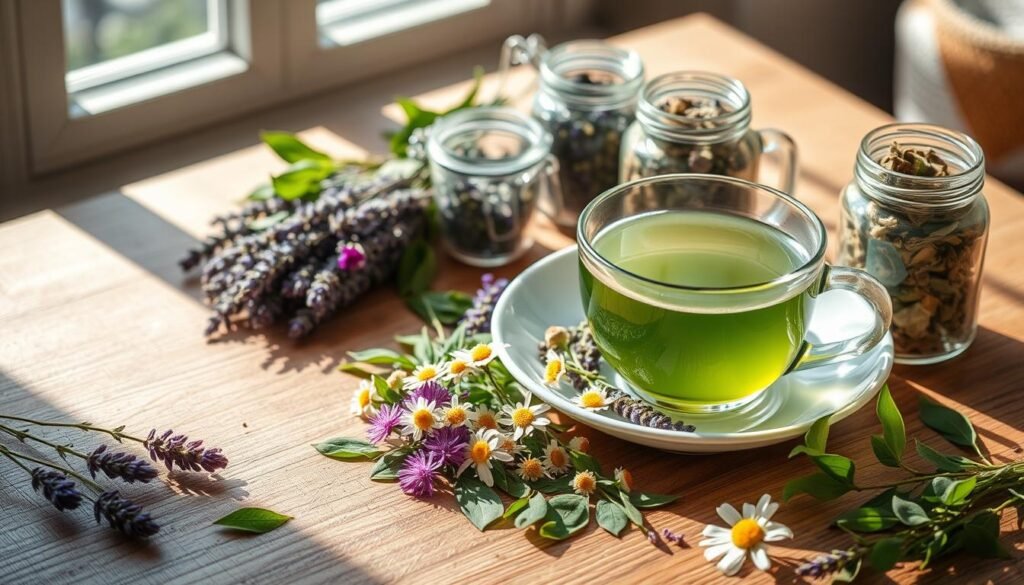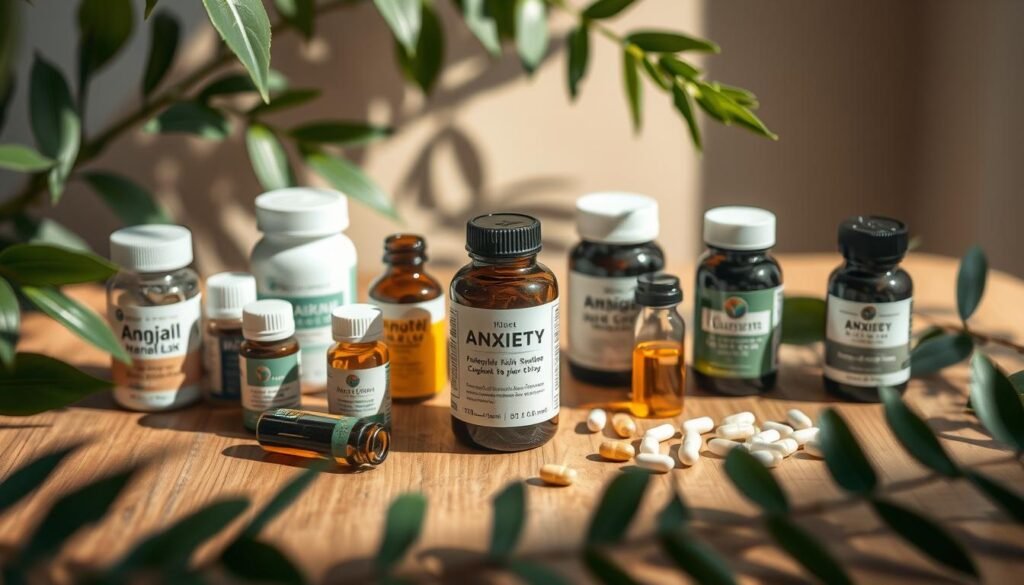Did you know that about 40 million adults in the U.S. face anxiety disorders? This fact highlights the need for effective anxiety relief options. L-Theanine is emerging as a top natural choice for stress relief. Found mainly in green and black tea, it’s known for reducing stress and boosting mental clarity.
We’re diving into how L-Theanine stacks up against other anxiety supplements. Scientific research suggests it may increase serotonin, dopamine, and GABA levels. This gives us good reason to compare it with other natural stress relief methods.
Let’s talk about how to use it, its possible benefits, and safety tips. People who drink tea often say they feel less anxious within 20-30 minutes of drinking it. This makes L-Theanine a quick and effective option for mood improvement. However, always check with health professionals before trying L-Theanine or any new supplement.
Key Takeaways
- L-Theanine can significantly reduce stress and enhance mood.
- Regular consumption of L-Theanine may lead to lower anxiety levels within 20-30 minutes.
- It’s essential to discuss starting any new supplements with healthcare providers.
- Other popular anxiety relief supplements also have varying degrees of effectiveness.
- Exploration of natural stress reducers can lead to personalized anxiety management strategies.
Understanding Anxiety and Its Impact
Anxiety disorders are a major mental health issue. They affect up to 40 million U.S. adults at some point. About 30% of American adults will encounter these disorders. Anxiety leads to symptoms that disrupt everyday life. This stems from the body’s stress response, releasing cortisol and adrenaline.
The Prevalence of Anxiety Disorders
Anxiety disorders are very common and affect many. Studies show that most Americans feel stress-related effects each month. Stress from work costs the U.S. about $300 billion in lost work each year. This affects both people and companies deeply. People under a lot of stress spend 50% more on healthcare. This highlights the importance of managing stress well.
How Anxiety Affects Daily Life
Anxiety touches all parts of life, often in tough ways. It comes from worries about money, work, and health. Anxiety can ruin sleep, focus, and mood. It can also lead to physical health issues, like harder arteries.
In one study, AlphaWave® l-Theanine helped reduce stress. It increased alpha brain waves and lowered stress hormones. This points to natural ways to handle anxiety.
Understanding anxiety helps in finding ways to cope. This is key to improving mental health. Knowing how anxiety changes daily life helps people manage it better. This leads to healthier living and feeling better overall.
What is L-Theanine?
L-Theanine is an amino acid found mainly in green tea leaves. It helps you relax without making you sleepy. People choose it for its benefits to well-being, as it fights stress and anxiety.
Source and Benefits of L-Theanine
Green tea is the primary source of L-Theanine. It’s also in supplements. Studies prove its power in easing anxiety during stress. In research with 104 people, most saw less stress.
It also improves sleep and may lower blood pressure in stress.
Mechanism of Action in Reducing Anxiety
L-Theanine boosts neurotransmitters like GABA, serotonin, and dopamine. These are essential for controlling mood and lessening anxiety. It helps various people, even those with schizophrenia, by reducing anxiety and other symptoms.
Together with caffeine, L-Theanine can also improve focus and brain function.
Studies confirm L-Theanine’s positive effects on the brain and sleep. These add to its value as a relaxation aid. For more on L-Theanine, see this source.
| Study Focus | Findings |
|---|---|
| Stress Reduction | Reduced anxiety in 80% of trials |
| Sleep Quality | Improved for both individuals and animals |
| Cognitive Enhancement | Increased focus alongside caffeine |
| Disease Prevention | Lower rates of respiratory infections reported |
Other Popular Anxiety Relief Supplements
Many people look for ways to ease anxiety without using traditional medications. There are several natural supplements believed to help with this. Magnesium, B vitamins, omega-3 fatty acids, valerian root, and chamomile are some of the top picks. Let’s delve into these options and see why they are popular.
Overview of Common Natural Stress Reducers
The most notable natural stress-fighting options include:
- Magnesium: A 2017 systematic review found it could help with anxiety, especially in those most at risk.
- B Vitamins: Eating foods high in B vitamins can lower anxiety. A study in 2017 linked a lack of vitamin B12 with more anxiety and depression.
- Omega-3 Fatty Acids: These, often found in fish oil, can cut down on anxiety symptoms. This was highlighted in a 2018 systematic review.
- Valerian Root: Known as a soothing herb, it may lessen anxiety and depression in some people.
- Chamomile: Research shows chamomile extract can reduce Generalized Anxiety Disorder (GAD) symptoms.
For more information on these herbs and their calming effects, you can check out more here: natural remedies for anxiety.
Comparative Effectiveness of Various Supplements
Knowing how different supplements stack up can help you choose wisely. Here’s a quick look at how some supplements compare in fighting stress:
| Supplement | Effectiveness | Application |
|---|---|---|
| Magnesium | Improves anxiety measures | General supplementation |
| B Vitamins | Linked to lower anxiety levels | Dietary adjustments and supplements |
| Omega-3 Fatty Acids | Reduces anxiety symptoms | Supplementation, dietary sources |
| Valerian Root | Reduces anxiety and depression | Herbal supplements |
| Chamomile | Decreases GAD symptoms | Extracts and teas |
When picking the best supplement for anxiety, it’s crucial to understand how they work. Always talk to a healthcare provider before starting new supplements. Especially if you’re already on anxiety meds. By adding the right supplements to your daily routine, you might find better mental health awaits.
L-Theanine vs Other Anxiety Supplements
The field of anxiety relief is diverse, with multiple options available. L-Theanine shines as a strong candidate among these. It’s matched against well-known herbal remedies like valerian root and chamomile. This gives a clear view of what might work best for anxiety management.
Direct Comparison with Herbal Remedies
L-Theanine is mainly found in green tea and works quickly to ease anxiety. It shows real promise with doses of 200 to 400 mg daily. On the other hand, herbal remedies like valerian root and chamomile work slower. Not everyone finds these herbs effective for anxiety.
Valerian root is valued for its calm-inducing benefits. Meanwhile, chamomile is popular as a relaxing tea.
Advantages and Disadvantages of Each Supplement
When picking an anxiety relief supplement, understanding their pros and cons is key. L-Theanine is quick to act, with few side effects like mild headaches or stomach issues. It’s safe for everyday use, up to 500 mg for adults. However, herbal remedies, while helpful, might not work the same for everyone. They often need more time to become effective.
- L-Theanine: Fast-acting, minimal side effects, regulates neurotransmitters.
- Valerian Root: Slower onset, potential drowsiness, not universally effective.
- Chamomile: Gentle calming effects, may take time to show results, generally safe.
Choosing between L-Theanine and herbal solutions is a personal journey. Talking to a healthcare professional can offer insights. This helps in picking the most fitting option for personal anxiety relief needs.
The Role of Neurotransmitters in Anxiety Relief
Knowing how neurotransmitters interact with anxiety is key to handling anxiety symptoms better. GABA, or gamma-aminobutyric acid, is important. It blocks stress signals in the brain. This can lead to less anxiety.
Serotonin and dopamine also play a big part. They help control how we feel overall.
Understanding GABA and Its Impact
GABA is the brain’s main calming neurotransmitter. It reduces neural activity. L-Theanine helps increase GABA, which makes people feel more relaxed and less anxious.
This leads to clearer thinking and less stress. More GABA means less anxiety.
Other Key Neurotransmitters Affected by Supplements
Serotonin and dopamine are also vital for mood stability. Serotonin makes us feel good. Dopamine boosts motivation and pleasure.
Supplements that impact these chemicals can help with anxiety. Knowing how these substances interact with neurotransmitters is crucial for picking anxiety relief methods.
| Neurotransmitter | Function | Impact on Anxiety |
|---|---|---|
| GABA | Inhibitory neurotransmitter that calms neural activity | Reduces feelings of anxiety and stress |
| Serotonin | Affects mood, emotion, and sleep | Improves overall mood, helping to manage anxiety |
| Dopamine | Involved in motivation and reward systems | Enhances mood and reduces anxiety symptoms |
Vitamin D, B Vitamins, and Anxiety
Nutrition is key to mental health, focusing on how certain vitamins affect anxiety levels. Vitamin D and anxiety research has shown a link between low vitamin D and more anxiety symptoms. Studies suggest people with low vitamin D might feel more anxious. It’s important to fix this for better mental health.
How Vitamin Deficiencies Relate to Anxiety
Low vitamin D can make anxiety worse. Nutrition and mental health are closely connected. Enough vitamin D can lessen anxiety symptoms. Getting sunlight and eating foods rich in vitamin D, like fatty fish and fortified dairy, are good ways to get enough vitamin D. Taking vitamin D supplements can also lower anxiety if you don’t have enough.
Effectiveness of B Vitamins in Mood Regulation
B vitamins, like B6 and B12, help control mood and handle stress. They are key in making serotonin, a chemical that affects mood. Taking B vitamins can help ease anxiety, research shows. Eating foods with B vitamins, such as whole grains, meat, and legumes, improves mental health.

The Place of Magnesium in Anxiety Management
Magnesium can play a big part in reducing anxiety and making us feel better. It’s important for many body functions, like reducing stress. The positive effects of magnesium on anxiety and mood are well-known.
Benefits of Magnesium for Stress Reduction
Magnesium is key in stress relief aids. It helps control brain chemicals that relax us. People with anxiety may greatly benefit from more magnesium. It can better sleep and lessen stress, creating more peace of mind.
Consequences of Magnesium Deficiency on Mood
Not having enough magnesium can be bad for our mood. It may make stress worse, leading to anxiety and mood issues. People low in magnesium might feel more irritated and less able to handle stress. Adding more magnesium to our diets can help fight anxiety. It gives us a better emotional balance. For further reading on magnesium and anxiety, check this resource.
Calming Herbal Remedies: What Works Best?
Herbal anxiety remedies are getting more popular as an alternative. Valerian root and chamomile are notable for their calming properties. They help people decide on natural treatments.
Herbal Supplements Such as Valerian Root and Chamomile
Valerian root is known for promoting relaxation and better sleep. It has been used for ages to ease insomnia and anxiety. Chamomile is famous for its stress-relieving effects. It helps with generalized anxiety disorder (GAD) and is often enjoyed as tea.
Scientific Evidence Supporting Their Use
Research looks into how valerian and chamomile affect anxiety levels. Though findings are mixed, they show chamomile can lower anxiety symptoms. Valerian helps in the short term. Before trying these remedies, talking to a healthcare professional is advised. The FDA doesn’t strongly regulate herbal supplements, so caution is needed. For more info, check this resource.

The Science Behind L-Theanine’s Effectiveness
L-Theanine is getting a lot of focus lately for its benefits. These include easing anxiety and making people feel better overall. Studies say that taking it regularly can seriously lower stress and anxiety. We’ll look into how effective L-Theanine is and talk about the side effects to watch for.
Research Findings on L-Theanine
There’s a lot of evidence that L-Theanine can really help with anxiety and stress. In one study with 30 people, taking 200 mg daily for four weeks made a big difference. They felt less anxious, according to a special anxiety score. The score’s improvement was significant, with a value of p = 0.006. This shows a strong link between taking L-Theanine and feeling less anxious.
The same research also found that people slept better. They had lower scores on a sleep quality index. This meant they fell asleep faster and weren’t waking up a lot at night (p
Potential Side Effects and Considerations
L-Theanine is usually safe, but some people might get mild headaches or stomach issues. There haven’t been any serious side effects linked to it. However, it’s always a good idea to talk to a doctor before starting any supplement, especially if you’re already taking medicine for anxiety or other conditions.
When it comes to dosage, 200 mg to 400 mg is considered safe for reducing anxiety. Lower doses might also work well when taken with other things like caffeine. Knowing about these details can help make sure that L-Theanine is both safe and helpful for managing anxiety.
How to Choose the Right Anxiety Supplement for You
Finding the best anxiety supplement involves careful thought about your health. A chat with a healthcare provider gives deep insights for your specific needs. They help you know your health history and symptoms, so you pick the right option.
Consulting with Healthcare Professionals
Talking to a healthcare pro before starting supplements is a must. They help choose the right ones, looking at things like:
- Efficacy of ingredients based on current research
- Potential side effects of how they might react with your health
- Ingredient quality and where they come from for safety
- Current medications to avoid bad mixtures
Factors to Consider When Selecting a Supplement
There are key things to remember when picking your supplement:
- Ingredient Research: Go for ingredients backed by science, like Solgar® Daily Stress Support’s Rhodiola and B-vitamins.
- Quality Control: Choose brands that are open about how they make and source their products.
- Dosage Recommendations: Start small to see how well you handle the supplement.
- Comprehensive Strategy: Think about pairing supplements with things like mindfulness or exercise.

Consider these points for a better journey towards easing anxiety. Understanding your needs and the supplement details leads to a safe and effective plan.
Conclusion
In exploring anxiety management, we see everyone’s experience is different. Comparing L-Theanine to other supplements shows each has its pros and cons. Studies by Kimura and colleagues found L-Theanine significantly lowers anxiety, proving its value.
Research by Yoto and others show L-Theanine not only eases anxiety but also boosts brain function and stress responses. Results highlighted a notable drop in stress among those taking L-Theanine. This information is crucial when choosing the right supplement for your needs.
Finding the best way to handle anxiety often requires expert advice. By examining different supplements, one can find a tailored approach to mental wellness. This strategy leads to better health outcomes and gives individuals more control over their journey to well-being.